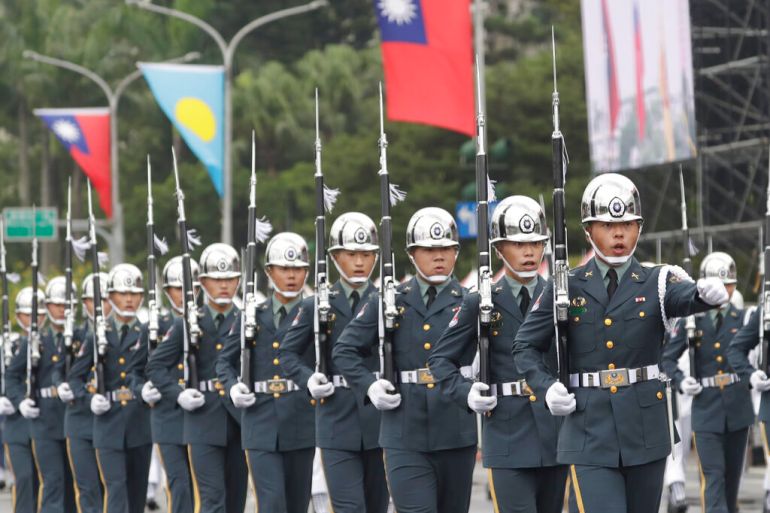Taiwan extends military service as China dials up pressure
Taiwan’s president has announced that compulsory military service will increase from four months to one year.

Taiwan will extend compulsory military service from its current four months to one year starting from 2024, President Tsai Ing-wen announced on Tuesday, as the self-ruled island comes under increasing Chinese military pressure.
Speaking after a national security meeting she had called to discuss reinforcing the island’s civil defence, Tsai said Taiwan wanted peace but needed to be able to defend itself.
Keep reading
list of 4 itemsChina says it reserves right to use force over Taiwan
China has rejected understanding with US on Taiwan, Blinken says
Taiwan president quits as party head after local election losses
“As long as Taiwan is strong enough, it will be the home of democracy and freedom all over the world, and it will not become a battlefield,” Tsai told a news conference announcing the decision, which she described as “incredibly difficult”.
The current military system, including training reservists, is inefficient and insufficient to cope with China’s rising military threat, especially if it launched a rapid attack on the island, Tsai added.
China’s “intimidation and threats against Taiwan are getting more obvious”, Tsai said. “No one wants war … but my fellow countrymen, peace will not fall from the sky.
“Taiwan wants to tell the world that between democracy and dictatorship, we firmly believe in democracy. Between war and peace, we insist on peace. Let us show the courage and determination to protect our homeland and defend democracy.”
Conscripts will undergo more intense training, including shooting exercises, combat instruction used by American forces, and operating more powerful weapons including Stinger anti-aircraft missiles and anti-tank missiles, Tsai said.
Taipei, which rejects Beijing’s sovereignty claims, reported the largest-ever Chinese air force incursion into the island’s air defence identification zone on Monday, with 43 Chinese planes crossing an unofficial buffer between the two sides.
China also staged extensive war games near the island in August following a controversial visit to Taipei by then-United States House Speaker Nancy Pelosi.
On Saturday, Beijing berated Washington for its new US defence spending bill which, with military support earmarked for Taiwan, amplified a “China threat” narrative, according to China’s foreign ministry. The ministry said in a statement that the defence bill “severely affects peace and stability across the Taiwan Strait”.
Mandatory military service was once deeply unpopular in Taiwan, and previous governments under the ruling Democratic Progressive Party and the main opposition Kuomintang cut the period of service for men from more than two years to four months to please younger voters. At that time, tensions had eased between Taipei and Beijing.
In recent years, China has stepped up diplomatic, military and economic pressure on the self-governed island to accept Beijing’s rule. Amid increasingly tense relations, polling showed that more than three-quarters of Taiwanese people now believe that four months of military service is too short.
Even after the extension, however, the period of service will still be shorter than the 18 months mandated in South Korea, which faces a hostile and nuclear-armed North Korea.
Conscripts would be tasked with guarding key infrastructure, enabling regular forces to respond more swiftly in the event of any attempt by China to invade, the defence ministry said at the same press conference.
Chieh Chung, a researcher at the National Policy Foundation, a Taipei-based think tank, estimated that the extension could add extra manpower of 60,000 to 70,000 annually to the current 165,000-strong professional force in 2027 and beyond.
Tsai is also overseeing a broad military modernisation programme, championing the idea of “asymmetric warfare” to make the island’s forces more mobile, agile and harder to attack.
China’s growing assertiveness towards the island as well as Russia’s invasion of Ukraine, have prompted debate in Taiwan about how to boost its defence systems.
Taiwan’s government insists that only Taiwanese people can decide their future and has pledged to defend itself if attacked by China.